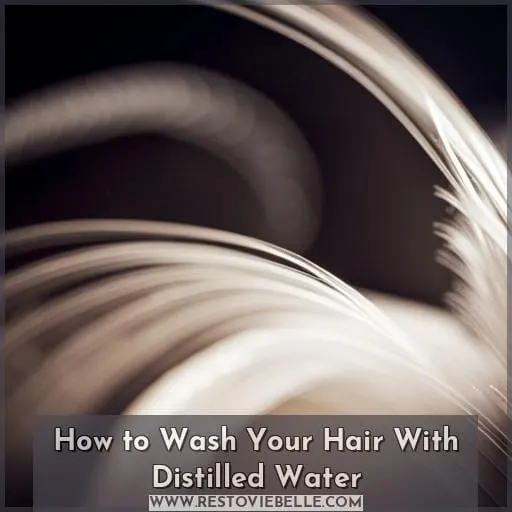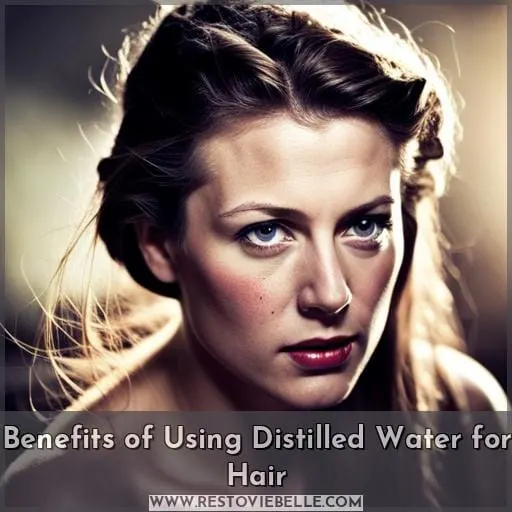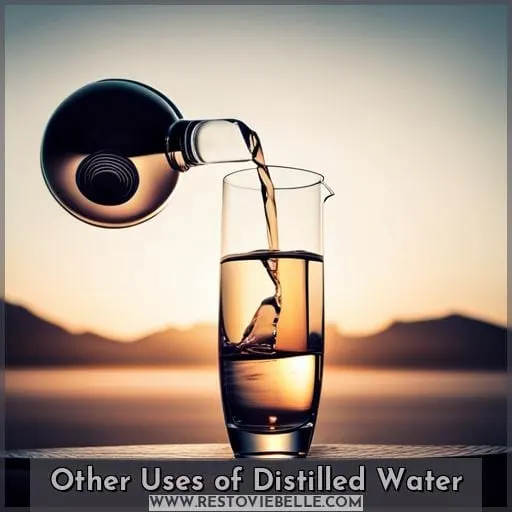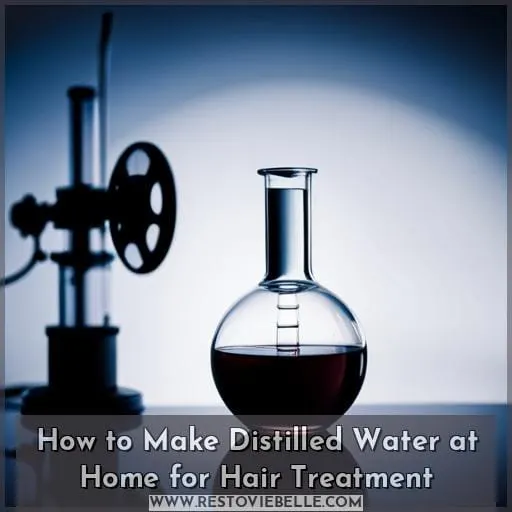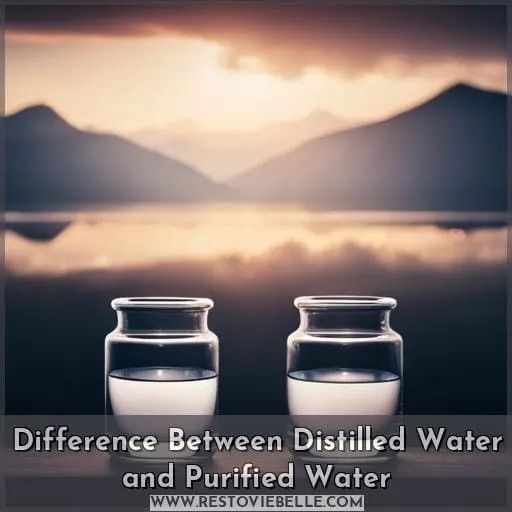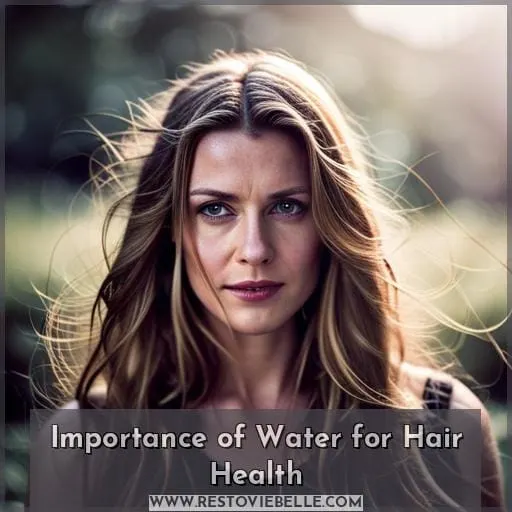This site is supported by our readers. We may earn a commission, at no cost to you, if you purchase through links.
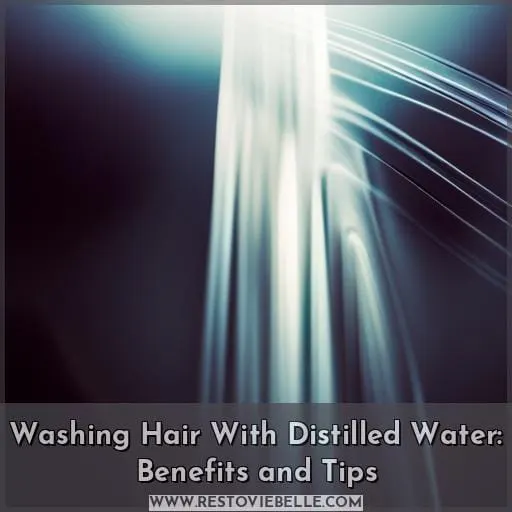
Table Of Contents
- Key Takeaways
- How to Wash Your Hair With Distilled Water
- How Much Distilled Water Do I Need to Wash My Hair?
- Benefits of Using Distilled Water for Hair
- Using Home Water Distillation Units for Hair Care
- Other Uses of Distilled Water
- How to Make Distilled Water at Home for Hair Treatment
- Difference Between Distilled Water and Purified Water
- Importance of Water for Hair Health
- Professional Advice on Using Distilled Water for Hair Care
- Conclusion
Key Takeaways
- Washing hair with distilled water promotes healthier hair overall by preventing damage from hard tap water and reducing mineral buildup.
- Distilled water makes hair softer and more manageable, enhancing its texture and appearance.
- Distilled water is compatible with hair care products and cosmetics due to its neutral pH, making it an excellent choice for various hair treatments.
- Using distilled water for hair care ensures purity, maintaining scalp health and preventing potential irritations.
How to Wash Your Hair With Distilled Water
Washing your hair with distilled water is a great way to keep it healthy, and you can even make your own natural shampoo recipe using this type of water. To get started, invest in a quality home distillation system and warm the distilled water to a comfortable temperature before use.
Steps to Washing Your Hair With Distilled Water
With your sophisticated knowledge of distilled water, you can now spruce up your ‘do with ease! To wash your hair with it, consider using a water distiller like the Midi Classic or Mini Classic CT. Warm it to a comfortable temperature and opt for natural shampoo. Rinse your hair and pat it dry.
Avoid using hairdryers when possible. Gently brush your hair from the ends to prevent knots, as washing it daily strips away natural oils.
Home countertop distillers provide an easy supply of purified water, perfect for baby formula, humidifiers, and more. They also help reduce plastic waste. Distilled water is essential in cosmetics because its pH closely matches the skin’s, making it ideal for skincare products.
Natural Shampoo Recipe With Distilled Water
Let your hair be its own kind of beautiful with a natural shampoo recipe made from distilled water. DIY haircare is an easy and affordable way to get the hydration, volume, and shine you want for your locks.
Start by warming the distilled water to a comfortable temperature to make it easier for ingredients like castile soap or essential oils, such as rosemary, to dissolve into it. Adjust the amount of distilled water based on how much product you use in styling your hair; longer hair requires more liquid shampoo than shorter styles do.
When mixing together all of these components, gently shake them up until they are completely blended together. Then, apply the mixture directly onto wet strands, massaging deeply into the scalp area when lathering up.
Make sure not to skip conditioning after using this homemade mixture since this DIY shampoo can be drying without something added back in afterward.
How Much Distilled Water Do I Need to Wash My Hair?
To determine the amount of distilled water needed to wash your hair, consider factors such as hair length and product use that can vary wildly – enough to make you feel like it’s an ocean!
Distilled water offers versatile options, providing safe conditions not only for washing your hair but also for other needs such as formula preparation, household humidifiers, car cooling systems, and plant care.
It is essential not just within the cosmetic industry but also for overall health maintenance, including drinking 8 glasses daily according to medical professionals recommending the purest form possible to remain a vital component of optimal body functions relating directly to skin and hair integrity.
Here are some key points to consider:
- Distilled Water Benefits: With its purity lacking minerals and harsh chemicals, distilled water is perfect for beneficial hair care.
- Hair Texture: The absence of minerals commonly found in hard water helps preserve natural oils, which aids in maintaining a healthy texture without dryness or itchiness.
- Scalp Health: The pH level of distilled water closely matches the skin’s own pH level, allowing for a healthier environment around the scalp area while reducing potential irritation due to incompatible products used with tap or well-water alternatives.
- Product Compatibility: Not only does this help ensure compatibility with product ingredients, but it also prevents mineral buildup from occurring over time when washing regularly with alternative sources of low-quality waters containing high sedimentation levels.
- Water Temperature: By warming your distilled water supply before use, you will be able to avoid any discomfort caused by using cold temperatures during the rinsing process after shampooing has been completed.
Benefits of Using Distilled Water for Hair
It is important to consider the purity of water when it comes to hair care, and distilled water provides a great solution. The biggest advantage of using distilled water for washing your hair lies in its lack of minerals and harsh chemicals that are commonly found in hard tap water.
Water Purity and Hair Care
You can trust that distilled water’s purity ensures healthy hair care. Its lack of harsh chemicals and minerals allows for hydration, pH balance, and improved hair texture. Home distillers provide a steady supply of clean water to use in your daily wash routine; warm it to a comfortable temperature before using shampoo or conditioner.
Distilled water helps preserve natural oils while keeping hairstyles intact with fewer split ends – especially beneficial for curly-haired folks! Appropriate amounts are based on length and product used – consult professionals if needed.
Haircare products often contain distilled H2O too; its close pH match makes it ideal as an ingredient as well as helping make strands soft yet manageable.
Protecting Hair From Mineral Residues
By using distilled water for your hair care, you can protect it from mineral residues and keep its natural oils intact with a dramatic effect. The absence of minerals in distilled water helps prevent residue build-up on the scalp, which can cause dryness and itching.
To begin DIY haircare with distilled water, consider investing in a home distillation system like AquaNui to ensure a consistent supply of purified liquid. Warm the extracted fluid to a comfortable temperature before use. This is especially important when washing a baby’s delicate hair or those with sensitive scalps.
Natural shampoos are preferable but should not be used daily. Rinse thoroughly after shampooing, then apply conditioner sparingly – all steps done using warm filtered H2O! Finally, pat lightly after rinsing out the product – no need for hairdryers!
Distilled water is key to healthy locks. Try it today for an improved look and feel!
Using Home Water Distillation Units for Hair Care
Are you seeking a reliable source of pure water for your hair care needs? Home Water Distillation Units are an excellent choice. Not only do these units provide clean, mineral-free distilled water, but they also allow you to calculate the exact amount needed depending on your hair length and product usage.
Types of Home Water Distillation Units
Discover the power of home water distillation units to provide a safe, pure source of water for your hair care needs. AquaNui offers several options, so you can find one that meets your requirements.
Distilled water provides many benefits, such as removing mineral residues and conditioning hair, making it soft and manageable. Plus, distilled water helps retain natural oils in colored hair, which keeps hairstyles intact and prevents split ends.
And don’t forget, its pH closely matches the skin’s pH—ideal for cosmetics! With all these advantages, plus being more affordable than bottled alternatives with less waste production, you’ll be glad you chose a home distillation unit!
Investing in one will help ensure healthier-looking locks while still being kind to our environment.
Calculating Distilled Water Requirements for Hair Care
To get the best results from your hair care routine, you’ll need to calculate how much distilled water is needed.
Depending on the length of your hair and any products used, you can calculate the usage for optimal moisture and style maintenance. If you’re using conditioner when washing with distilled water, apply only a small amount before rinsing thoroughly with warm purified H2O (98-100 degrees Fahrenheit).
For curly locks, regular use of distilled water can help keep ringlets defined without weighing them down or causing knots due to mineral buildup from hard tap water sources.
Other Uses of Distilled Water
You may be surprised to learn that distilled water is used for much more than just hair care. It not only serves as an essential ingredient in skincare and hair care products but can also be found in laboratory experiments and medical devices.
Distilled Water in Skincare and Haircare Products
Experience the power of distilled water in skincare and haircare products for soft, manageable hair. Using distilled water can provide several benefits: cosmetic formulation, pH compatibility, hair conditioning, and solvent benefits.
These advantages are essential to many industries, including personal care and medical devices. Distilled water’s lack of minerals makes it ideal for use as a solvent in cosmetics.
Distilled water also helps condition hair by restoring moisture and preventing split ends caused by the mineral buildup on strands from hard water.
The versatility of distilled water extends beyond beauty. It is used in humidifiers, laboratory experiments, and more, making it an invaluable resource for people seeking liberation from harsh chemicals or contaminants found elsewhere.
Distilled Water in Laboratory Experiments and Medical Devices
Uncover the advantages of using distilled water in laboratory experiments and medical devices for a more reliable, precise outcome. Distilled water is essential for scientific research, providing greater accuracy in laboratory applications than tap or spring waters.
Its use helps ensure accurate results with its pure composition absent from contaminants that can affect outcomes.
It’s also beneficial to healthcare as it enables better performance of instruments used daily such as dialysis machines and X-ray systems by flushing out residues left by minerals found in hard water. As distilled water offers improved precision compared to other types of H2O, it contributes significantly to the development of new medicines and treatments while maintaining safe standards set forth by regulatory authorities worldwide.
Moreover, its lack of impurities makes it ideal for pharmaceutical production due to fewer rejections related problems during manufacturing processes or clinical studies involving human subjects – thus ensuring safer products reach consumers faster without compromising quality control measures put into place throughout all stages involved in the drug development life cycle process.
How to Make Distilled Water at Home for Hair Treatment
If you want to make your own distilled water for hair care, there are several distillation methods available. Whether you use a countertop or boiler-type system, understanding the steps involved and how to properly use homemade distilled water can help ensure healthy and beautiful hair.
Distillation Methods for Making Distilled Water
Discover the various distillation methods you can use to make your own distilled water for hair treatment.
- Boiling: One of the most popular methods is boiling, which involves placing untreated water in a heat-safe container and heating it until it boils off as steam. Once cooled, this steam condenses back into pure liquid form that is free from contaminants and minerals.
- Water Distillers: Another option is using a home-based countertop or tabletop distiller with an interior boiling chamber that heats up untreated tap water before releasing purified vapor into another collection vessel where it cools down again to be used later on.
- Filtration Systems: Lastly, filtered systems are also available for homeowners who want more control over their drinking supply by removing particles such as lead and other heavy metals from their tap water before they consume them directly or use them in cosmetic applications like shampooing hair with distilled water’s benefits.
Tips for Using Homemade Distilled Water for Hair Care
Gain an understanding of the benefits of using distilled water to care for your hair. For a DIY hair mask, use warm distilled water combined with natural ingredients like honey or avocado. This is great for scalp health and helps reduce split ends while promoting softness and shine.
Water temperature matters; it should be between 98-100 degrees Fahrenheit before use.
Avoid harsh chemicals commonly found in hard water that can damage delicate strands over time by opting for this gentle alternative instead – you’ll thank yourself later!
Difference Between Distilled Water and Purified Water
Comparing distilled water and purified water can help you determine which one is best for your hair care needs. Distilled vs. Purified: the main difference between the two is that distilled water has been boiled to create steam, which then condenses back into liquid, while purified usually refers to tap or spring-sourced waters that have undergone filtration processes such as reverse osmosis, carbon filtering, distillation, etc.
Here are three key points about using either type of water on your hair:
- Hair Benefits – Distilled Water retains natural oils better than Purified Water; it is ideal for colored hair as it keeps hairstyles intact and prevents split ends.
- Water Distillers – AquaNui home units provide options based on length and product use.
- Cosmetic Solvent – Ideal pH matches the skin’s, making it perfect for skincare products.
It’s important to note that pediatricians recommend only using distilled water when preparing formula milk, and dermatologists suggest drinking 8 glasses a day of any type of clean source (distilled or not).
Importance of Water for Hair Health
It is essential to understand the importance of water for hair health, especially when it comes to daily water intake and the effects of hard water on hair. Proper hydration plays an integral role in keeping your locks looking healthy and strong; however, too much hard or mineral-rich tap water can strip away natural oils, leading to dryness and itching.
Daily Water Intake for Healthy Hair
Staying hydrated is key to maintaining healthy hair, so make sure you drink 8 glasses of water a day! It’s not only essential for overall health, but also helps with nourishing your scalp and keeping it well-hydrated.
A nutrient-rich diet is equally important as it provides the necessary vitamins and minerals needed for strong and shiny hair. Additionally, regular haircare routines such as washing your hair regularly with distilled water can help maintain its natural oils.
Try switching up styling tips too by using gentle heat rather than harsh blow-drying techniques, which could strip away moisture from the strands.
Effects of Hard Water on Hair
You may not have realized it, but hard water can cause serious damage to your hair, leading to dryness and itchiness with its harsh minerals. Choosing the right shampoo for you is essential in offsetting mineral buildup from hard water.
Depending on your hair texture and scalp health conditions, select a product that promises gentleness while cleansing away impurities caused by high levels of calcium carbonate or magnesium sulfate found in hard water.
Taking care of your tresses goes beyond simply washing them; be sure that you are using distilled soft water when cleaning as this will provide optimal results for healthy locks free of any debris caused by excessive mineral buildup!
Professional Advice on Using Distilled Water for Hair Care
Dermatologists recommend using distilled water for hair care to maintain healthy locks. Its purity helps protect hair from hard water damage, and its gentleness preserves the natural oils that keep our scalp hydrated.
Here are a few expert recommendations on how to best use distilled water for your strands:
- Use a distiller like AquaNui’s Midi Classic or Mini Classic CT to obtain the right amount of pure H2O needed based on your hair length and product usage.
- Warm up the freshly made liquid before applying it with your hands onto dampened tresses. This can be done by simply letting it sit in warm ambient air or heating up slightly in a pot over medium heat (not boiling!).
- To get maximum benefits, experts suggest shampooing less often as frequent washing can strip away essential oils along with any dirt buildup.
Finally, make sure you rinse off all products thoroughly after each wash session with good quality fresh distilled H2O.
Conclusion
Overall, washing your hair with distilled water is an excellent choice for a variety of reasons. It not only provides a pure and clean source of water for your hair but also helps preserve the natural oils in your hair and protect from harsh chemicals and minerals found in hard water.
With the right distillation system and natural shampoo, distilled water can help keep your hair soft and manageable. It can also be used for a variety of other purposes, such as baby formula and humidifiers.
Ultimately, distilled water is a great choice for maintaining healthy hair and protecting your family from contaminants.

